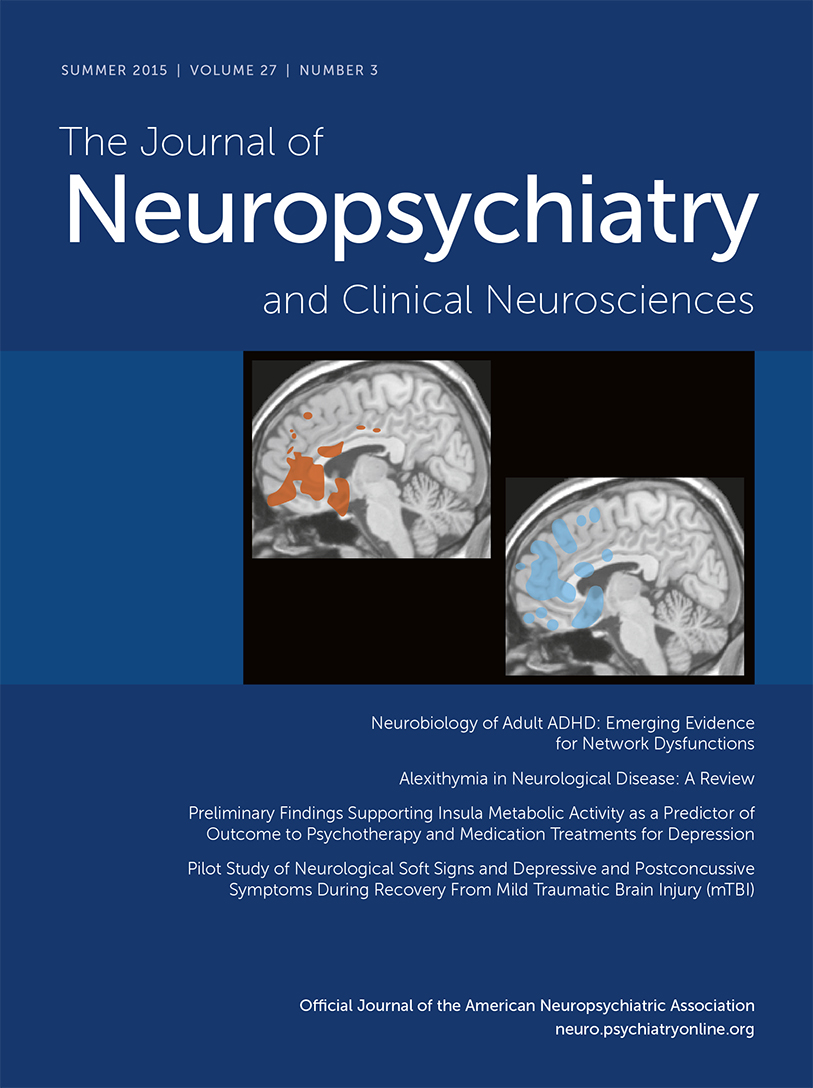Pharmacotherapy in Bipolar Depression Comorbid With Parkinson’s Disease: A Case Report
To the Editor: Pharmacotherapy for neuropsychiatric symptoms in patients with bipolar disorder comorbid with Parkinson’s disease (PD) is complicated. Here, a case report with quetiapine monotherapy demonstrating a favorable response is presented.
Case Report
A 62-year-old woman was admitted to the psychiatric inpatient unit because of remarkable depressed mood, suicidal ideation, and persecutory delusions. Reviewing her psychiatric history, she suffered from bipolar disorder with six manic episodes and one major depressive episode in the past 20 years. She had also been diagnosed with PD and treated with controlled-release levodopa/benserazide (Madopar HBS) at the neurology clinic for 4 years. After admission, none of her history of substance abuse and head injury had been identified. The laboratory tests and MRIs of the brain revealed unremarkable findings. She scored 39 points in the 21-item Hamilton Depression Rating Scale (HDRS), indicating a severe depressive state. With the concern of drug-induced psychosis, Madopar HBS was withdrawn during the first 2 weeks, whereas quetiapine was applied and titrated gradually to 100 mg/day. However, in the second week, her motor symptoms including masked face, cogwheel rigidity, bilateral resting hand tremor, and difficulty walking developed without any improvement in persecutory delusions. With the reintroduction of Madopar HBS 375 mg/day from the third week, her motor symptoms improved dramatically while her depression and persecutory delusions persisted (HDRS scores:37). Thus, quetiapine was titrated gradually up to 500 mg/day with careful monitoring of her parkinsonism. Finally, she was discharged with the amelioration of depression and persecutory delusions (HDRS scores:14) after a 40-day treatment. No worsening of her parkinsonism had been identified.
Discussion
A recent study has shown that patients with bipolar disorder were more vulnerable to developing PD than nonpsychiatric subjects, with an adjusted hazard ratio of 5.02 (95% confidence interval, 3.85–6.55) during the 6-year follow-up period.1 Pharmacotherapy for neuropsychiatric symptoms in patients with bipolar disorder comorbid with PD warrants special caution regarding its side effects. Medications, especially antipsychotics, used in patients with bipolar disorder may worsen parkinsonism of patients with PD.2 Moreover, drug-induced psychosis and mania have been documented in patients with PD treated with antiparkinson agents including anticholinergics, dopamine agonists, and levodopa.3 However, considering the temporal relationship between the administration of Madopar HBS and persecutory delusions, it seems unlikely to propose drug-induced psychosis in this case. Although not identified in this patient, psychotic symptoms because of substance abuse and general medical conditions other than bipolar disorder or PD should also be kept in mind. Despite more empirical evidence of clozapine for the treatment of psychosis in PD patients, quetiapine was applied in this patient in consideration of its efficacy in bipolar depression, low possibility to worsen parkinsonism, and moderate metabolic adverse effects.4,5
In summary, our case presentation highlights the efficacy of quetiapine monotherapy with the dosage as high as 500 mg/day in a patient bipolar depression comorbid with PD without worsening of parkinsonism.
1 : Psychiatric diseases predated the occurrence of Parkinson disease: a retrospective cohort study. Ann Epidemiol 2014; 24:206–213Crossref, Medline, Google Scholar
2 : Drug-induced parkinsonism. Expert Opin Drug Saf 2013; 12:487–496Crossref, Medline, Google Scholar
3 : Neuropsychiatric effects of Parkinson’s disease treatment. Australas J Ageing 2012; 31:198–202Crossref, Medline, Google Scholar
4 : Pharmacological treatment of Parkinson disease: a review. JAMA 2014; 311:1670–1683Crossref, Medline, Google Scholar
5 : Quetiapine: a review of its use in the management of bipolar depression. CNS Drugs 2012; 26:435–460Crossref, Medline, Google Scholar



